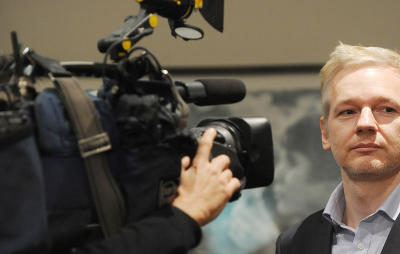Introduction
May 24, 2011

It's the biggest intelligence breach in U.S. history -- the leaking of more than a half million classified documents on the WikiLeaks website throughout 2010. At the center of the controversy stands Bradley E. Manning, the Army intelligence analyst who's charged with handing them over.
Who is Bradley Manning, and what does his story tell us about how and why the secret cache of documents may have been leaked? In WikiSecrets, FRONTLINE correspondent Martin Smith gains exclusive access to those closest to Manning -- including his father, close friends and his Army bunkmate -- and uncovers video of Manning taken around the time of the alleged handover of classified information.
Smith also examines the events surrounding the publication of the leaked documents, interviewing key players like WikiLeaks founder Julian Assange; Assange's former colleague Daniel Domscheit-Berg; and Adrian Lamo, a well-known figure in the cyber underground who eventually turned Manning over to the authorities and is now living in an undisclosed location over fears for his safety.
"I got the sense that Bradley was very depressed," Lamo tells FRONTLINE of his impressions of Manning after the Army private sought him out in May 2010. During an online chat with Lamo that stretched over four days, Manning wrote: "Hillary Clinton and several thousand diplomats around the world are going to have a heart attack when they wake up one morning and find an entire repository of classified foreign policy is available, in searchable format, to the public."
As the film tracks Manning from his deployment to Iraq through his arrest and imprisonment, several key questions emerge -- among them, the shocking ease with which Manning browsed and downloaded so much classified information from Pentagon servers despite the widely available systems developed to prevent exactly this. The case presents an important cautionary note to the theory that lower-level analysts like Manning should have access to such a wide range of intelligence: "9/11 surfaced the fact that there was less than adequate sharing of information across the government," says former Director of National Intelligence John Negroponte. "We went from a need-to-know philosophy to a need-to-share." Former State Department official Larry Wilkerson says the government may have shared the information too widely: "Bradley Manning does not need to know what the secretary of defense said to his counterpart in Paris."
WikiSecrets also examines the relationship between Manning and Julian Assange, the founder of WikilLeaks. In public statements, and in his interview with FRONTLINE, Assange has denied any direct contact with Manning or any WikiLeaks source. But hacker Lamo says that Manning indicated otherwise in their online chat: "He mentioned Julian Assange in the context Julian was the individual at WikiLeaks who he had initially establish contact with."
Wired.com's Kim Zetter tells FRONTLINE of an email she received from Assange not long after the story broke. "He contacted me, and he wanted the chat logs," she said. "He said that he needed it in order to prepare Manning's defense. ... I can only speculate, but I think that he was concerned about what was in the chat logs about himself."
"We don't really know whether Manning approached WikiLeaks or people around WikiLeaks or if it was the other way around," says Eric Schmitt, the New York Times reporter first assigned by the paper to vet the leaked material. "But my theory is whichever way it is, there's an intermediary. ... So somewhere in this mix you have Manning with access to this information; you've got WikiLeaks and Julian Assange with the desire to get it; and you've got a helpful intermediary. And somewhere in between here there's a transfer I believe takes place."
Was Julian Assange prepared to publish some of the leaked documents without adequately redacting the names of people who could have been harmed by the disclosures? "Julian was very reluctant to delete those names, to redact them." David Leigh of the Guardian newspaper tells FRONTLINE of meetings he attended with Assange in the run-up to publication of the war logs. "And we said: 'Julian, we've got to do something about these redactions. We really have got to.' And he said: 'These people were collaborators, informants. They deserve to die.' And a silence fell around the table."
Assange maintains WikiLeaks employed a thorough "harm-minimization process," but insiders within the organization said the redactions were carried out in haste just prior to publication.
Currently, Manning remains jailed in the Army brig in Fort Leavenworth, Kan., awaiting his first pretrial hearing this summer, and Assange lives under police watch in a home northeast of London. He tells FRONTLINE that the work of WikiLeaks continues: "History is on our side. ... When you expose powerful organizations, there will be ad hominem attacks. Yes, in my personal case, they've been rather hard. But it's not an unusual circumstance. ... WikiLeaks is continuing to step up its publishing speed, ... and it does good. We can see the effects all around us."
Posted May 24, 2011
Watch WikiSecrets »
FRONTLINE series home | Privacy Policy | Journalistic Guidelines | PBS Privacy Policy | PBS Terms of Use
COMMENTS
blog comments powered by DisqusIn order to foster a civil and literate discussion that respects all participants, FRONTLINE has the following guidelines for commentary. By submitting comments here, you are consenting to these rules:
Readers' comments that include profanity, obscenity, personal attacks, harassment, or are defamatory, sexist, racist, violate a third party's right to privacy, or are otherwise inappropriate, will be removed. Entries that are unsigned or are "signed" by someone other than the actual author will be removed. We reserve the right to not post comments that are more than 400 words. We will take steps to block users who repeatedly violate our commenting rules, terms of use, or privacy policies. You are fully responsible for your comments.